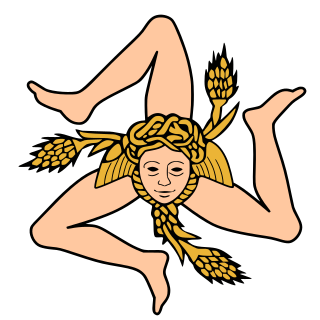
Democracy is Freedom – The Daisy, commonly known simply as The Daisy, was a centrist political party in Italy. The party was formed from the merger of three parties within the centre-left coalition: the Italian People's Party, The Democrats and Italian Renewal. The party president and leader was Francesco Rutelli, former mayor of Rome and prime ministerial candidate during the 2001 general election for The Olive Tree coalition, within which The Daisy electoral list won 14.5% of the national vote.

The Movement for the Independence of Sicily was a separatist Sicilian political party originally active in Sicily from 1943 to 1951. Its best electoral result was in 1947, when it won 8.8% of the votes in the Sicilian regional election and had nine regional deputies elected. The goal of the party was the annexation of Sicily to the United States.

The Politics of Sicily, Italy takes place in a framework of a semi-presidential representative democracy, whereby the President of Regional Government is the head of government, and of a pluriform multi-party system. Executive power is exercised by the Regional Government. Legislative power is vested in both the government and the Sicilian Regional Assembly.

The 1991 Sicilian regional election was held on 16 June 1991.

The 1947 Sicilian regional election took place on 20 April 1947. They were the first-ever election of the Sicilian Parliament.

The 1951 Sicilian regional election took place on 3 June 1951 to select the Second Sicilian Parliament.

The 1955 Sicilian regional election took place on 5 June 1955.

The 1959 Sicilian regional election took place on 7 June 1959.

The 1963 Sicilian regional election took place on 9 June 1963.

The 1971 Sicilian regional election took place on 13 June 1971.

The 1976 Sicilian regional election took place on 20 June 1976.

The 1981 Sicilian regional election took place on 21 June 1981.

The 1986 Sicilian regional election took place on 22 June 1986.

In Italy, there are some active movements and parties calling for autonomy or even independence for the areas comprised within the historical Kingdom of the two Sicilies: that is, Southern Italy and/or the region of Sicily. No political movement promoting these ideas has ever been successful in gaining traction among the population. The movement remains on the fringes with no representation in the Italian parliament.
The centre-right coalition is a political alliance of political parties in Italy, active—under several forms and names—since 1994, when Silvio Berlusconi entered politics and formed his Forza Italia party.

Sicilian nationalism is a movement in the autonomous Italian region of Sicily, as well as the Sicilian diaspora, which seeks greater autonomy or outright independence from Italy, and/or promotes further inclusion of the Sicilian identity, culture, history, and linguistic variety.

Salvatore "Salvo" Andò is an Italian academic and politician. He is the son of the politician Biagio Andò.
Future Sicily is a regional centrist political party active in Sicily, Italy, led by former minister Salvatore Cardinale, whose daughter Daniela Cardinale is a deputy of the Democratic Party (PD).

Salvatore Lauricella was an Italian attorney, politician, and chairman of the Italian Socialist Party.








